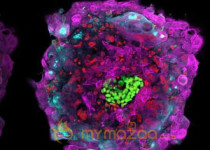It's a milestone that's at once being called groundbreaking and a Pandora's box: Scientists at Cambridge University surprised even themselves by growing embryos for 13 days outside the womb—one day short of a longstanding legal limit that's never been pushed up against because embryos failed to survive that long.
The researchers did it with only a thick blend of nutrients that mimic the womb, they report in the journal Nature Cell Biology. Because rudimentary cell development takes place at the 14-day mark, more than a dozen countries including the US and UK restrict embryo research after that point.
As Nature puts it: "After this time, the logic goes, a unique individual comes into being." Given how difficult it is to observe this early but critical formation of life in the mother, scientists are largely in the dark about just what sort of cellular and molecular activity is taking place, reports the Telegraph.
"It is a most enigmatic and mysterious period of our development which we have never had any access to," says the lead author. The vast majority of pregnancies that fail are the result of improper implantation, so learning exactly what happens in this stage is critical to improving viability.
Implantation is also when "many developmental defects can become acquired," she continues, "but until now, it has been impossible to study this in human embryos." "It's a big deal," reports Vice's Motherboard, which notes that by being able to observe how embryos change around day 14, "when the embryo becomes a self-organizing ball of cells destined to become a baby," we could better understand not just development but fertility and disabilities.
But critics worry about testing embryos beyond 14 days. "Pro-life means you protect human life," one ethicist tells the Telegraph. "There’s no protection being in a petri dish being experimented on." (A US panel recommends approving three-parent IVF.)












